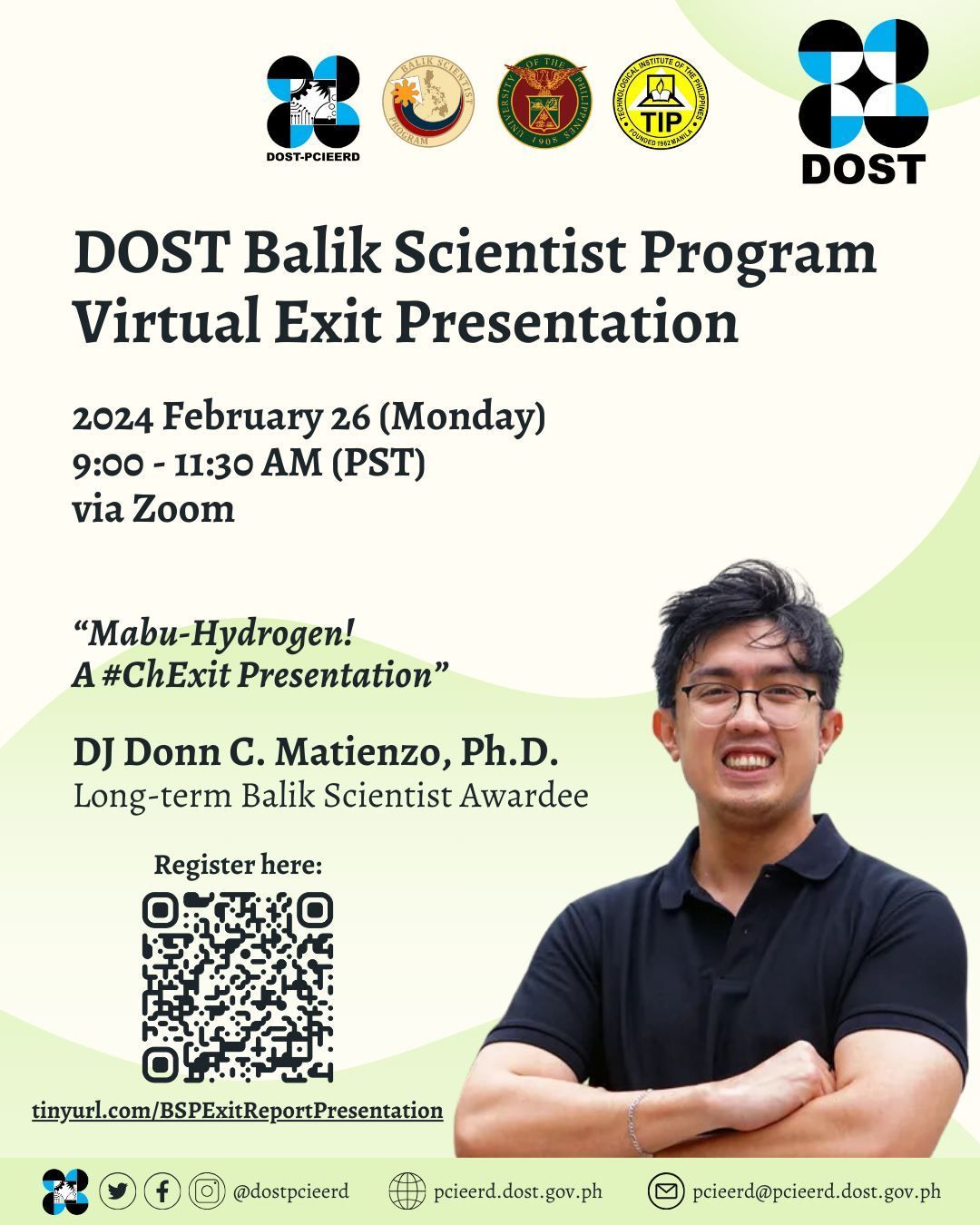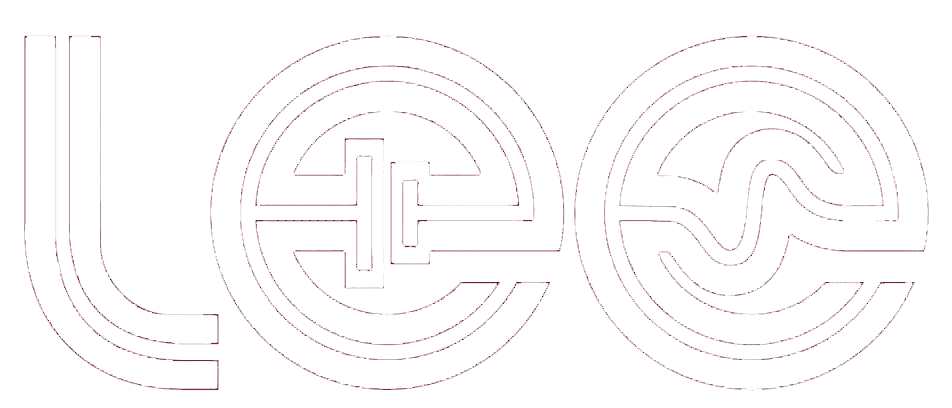Engr. Kevin Lester Lobo successfully defends his Master's Thesis
Mecaelah Palaganas • Jan 20, 2024
Engr. Kevin Lester Lobo, a Master of Science in Energy Engineering student and a scholar of
DOST-ERDT, successfully defended his thesis titled
"Transitioning into an Optimal Renewable Energy System with Energy Storage in Island Resorts in the Philippines: A Case Study"
on December 6, 2023.
The defense panel included Prof. Joey D. Ocon, Ph.D.
as the primary adviser, Prof. Carl Michael F. Odulio, Ph.D. as the co-adviser, Prof. Louis Angelo M. Danao, Ph.D.
as the Chair, and Dr. DJ Donn C. Matienzo
as the reader.
Diesel power plants have historically dominated off-grid electrification in the Philippines, posing challenges in reliability, cost, and environmental impact. Engr. Lobo's study addresses this by proposing an optimal energy system transition for two case study island resorts in Malapascua Island, Cebu,
and Boracay Island, Aklan. The proposed configuration includes Solar PV, Battery Energy Storage System (BESS),
and Hydrogen Energy Storage System (HESS).
Results from energy system optimization reveal that the Hybrid Renewable Energy System (HRES) configuration, integrating Solar PV/BESS/Grid/Diesel Generator, offers the lowest Levelized Cost of Electricity (LCOE) for both case study resorts. This translates to a notable improvement of 7.5% for CS1 and 0.769% for CS2 compared to the current LCOE. Post-simulation analysis and sensitivity scenarios consistently support the superiority of the HRES configuration.
Engr. Lobo's innovative research was not only recognized through successful thesis defense but also showcased at the international conference on Sustainable Energy and Green Technology (SEGT) 2023
in Ho Chi Minh City, Vietnam,
held last December 2023. These highlights the significance of his work in advancing sustainable energy solutions for island resorts in the Philippines.
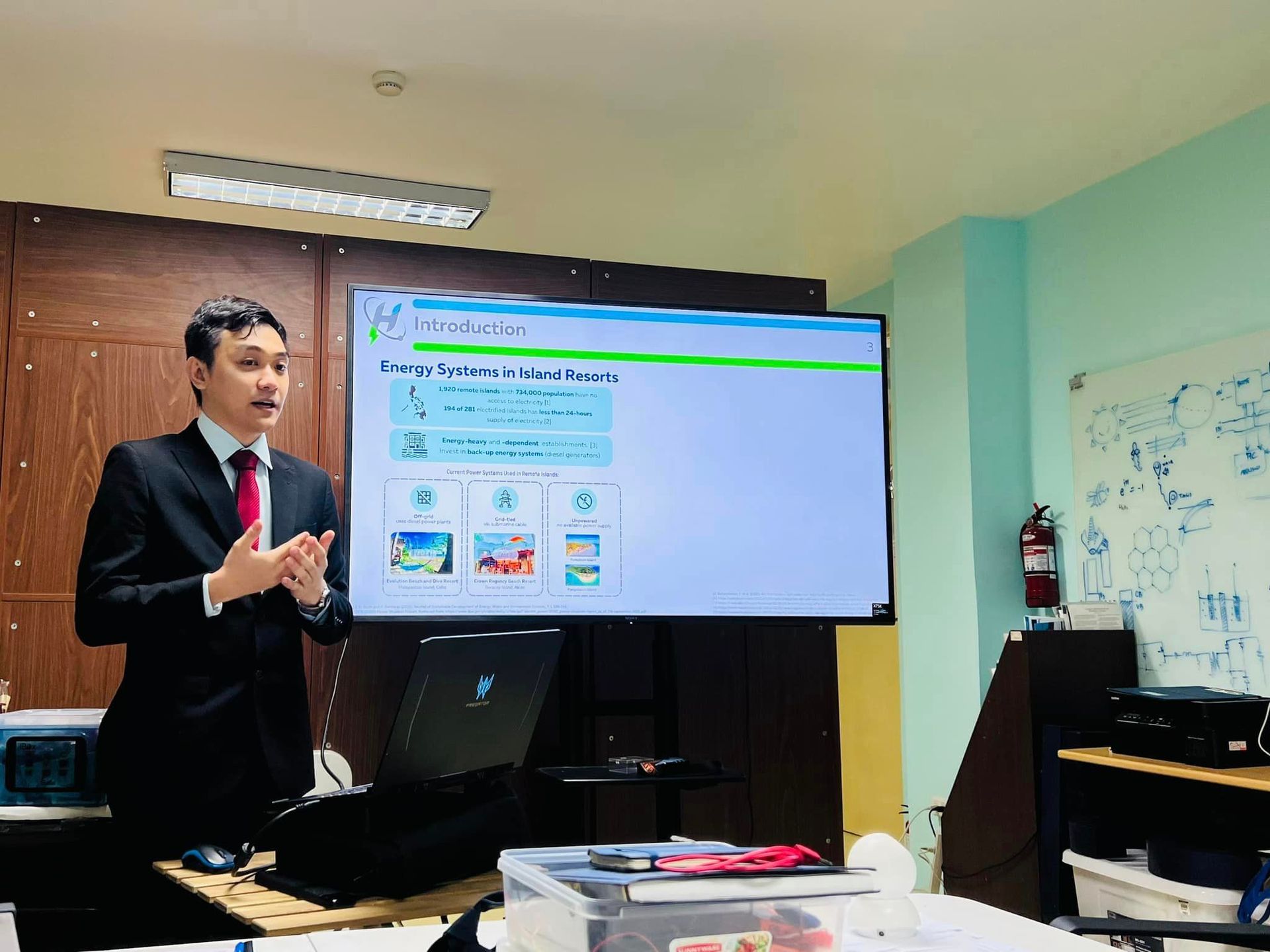
Slide title
Engr. Lobo during his thesis defense.
Button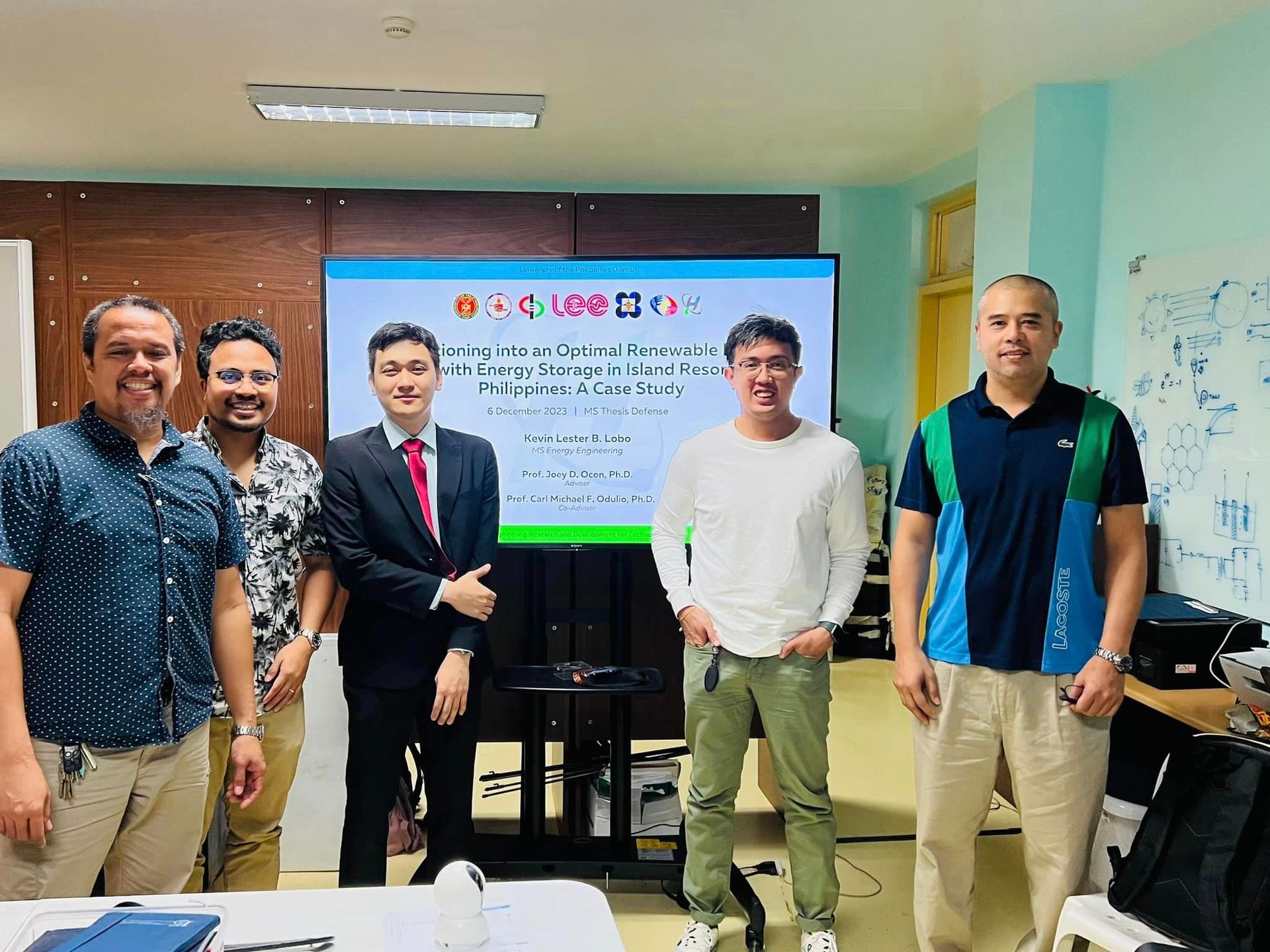
Slide title
Engr . Lobo with the Thesis Committee (L-R: Prof. Louis Angelo M. Danao, Ph.D., Prof. Joey D. Ocon, Ph.D., Dr. DJ Donn C. Matienzo, Prof. Carl Michael F. Odulio, Ph.D.)
Button
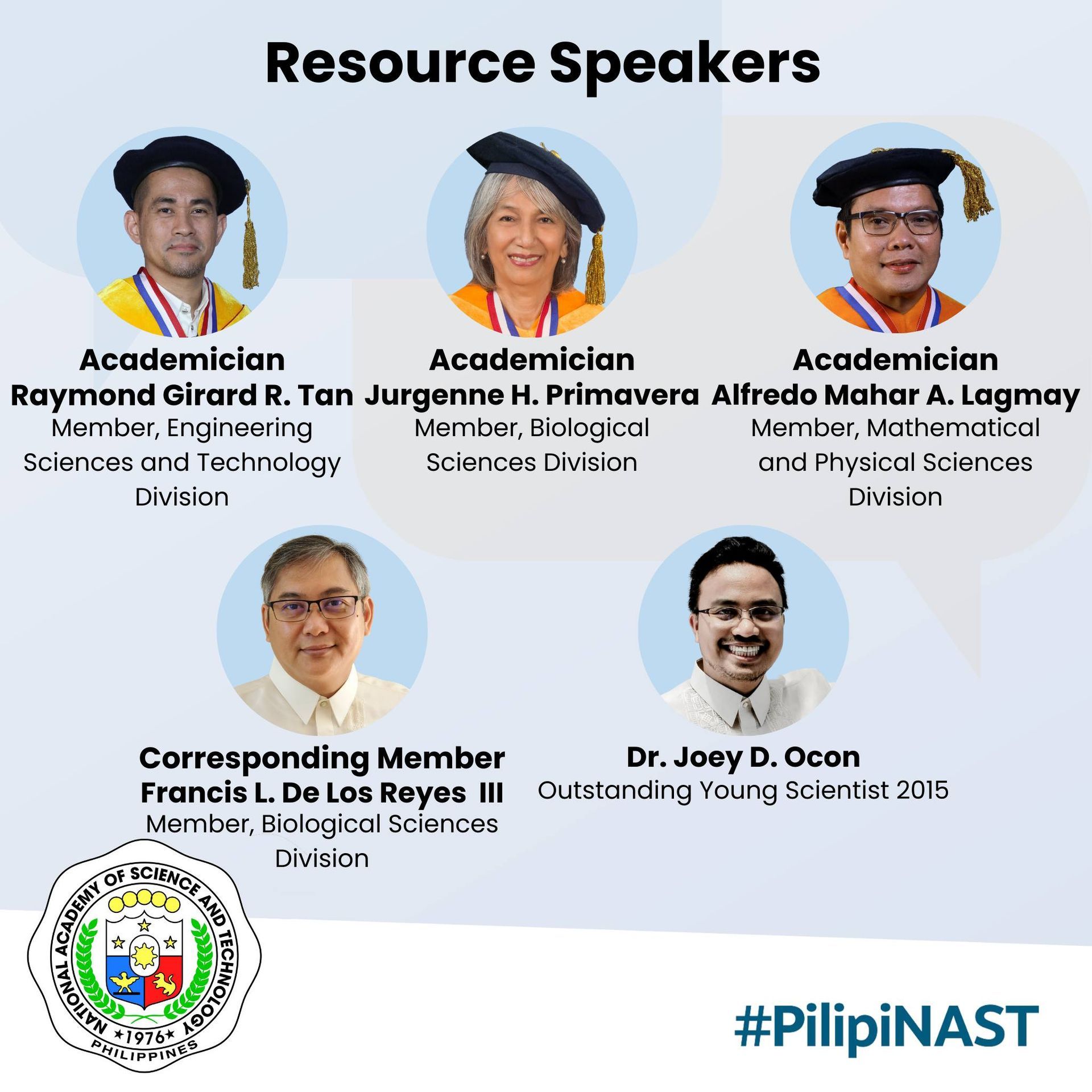
By Mecaelah Palaganas
•
12 Apr, 2024
The National Academy of Science and Technology Philippines (NAST PHL) conducted a three-part webinar series on the Innovations for Human and Planet Health and Security to promote open innovation and collaboration as a defining factor of socio-economic development. Highly esteemed NAST members of the representative divisions of various fields in science, awardees, and experts were invited to tackle the current innovation ecosystem of the Philippines and the innovative solutions that address food security and climate change. Aimed to promote multidisciplinary discourse and partnerships, the event was participated by researchers, policymakers, government officials, and the general public. Among the prestigious roster of resource speakers was Prof. Joey D. Ocon who delivered his talk on “Next Generation Batteries and Green Hydrogen with Renewables: Opportunities in the Clean Energy Transition” during the third segment of the NAST PHL Innovation Series. Prof. Ocon shared insights on the crucial role of energy storage technologies in the transition to renewable energy sources and the scalability of energy systems that can help satisfy the energy demand in the country. As part of the vertically-integrated R&D agenda of the Laboratory of Electrochemical Engineering (LEE), he also introduced water electrolyzer technologies involved in the production of Green Hydrogen. Moreover, the research facilities in LEE such as the CHED-LAKAS funded Hydrogen as Vector for Energy (HyVE) Research Facility and the DOST-NICER funded Advanced Batteries Center, both of which are first of its kind within the country, were highlighted as well as their capabilities and future endeavors. In the area of commercialization, Prof. Ocon discussed the multi-scale approach of the startup Nascent Technologies Corporation and its mission on industrial decarbonization by providing technologies and solutions for various energy storage applications. Through information dissemination in his thematic talk, more innovators and collaborators can come forward in support of the vision of the ongoing projects led by Prof. Ocon and devise integrative innovations that can contribute to the clean energy transition in the Philippines. Reference: https://nast.dost.gov.ph/index.php/13-news-press-releases/752-nast-phl-to-conduct-webinar-series-on-innovations-for-food-security-climate-change
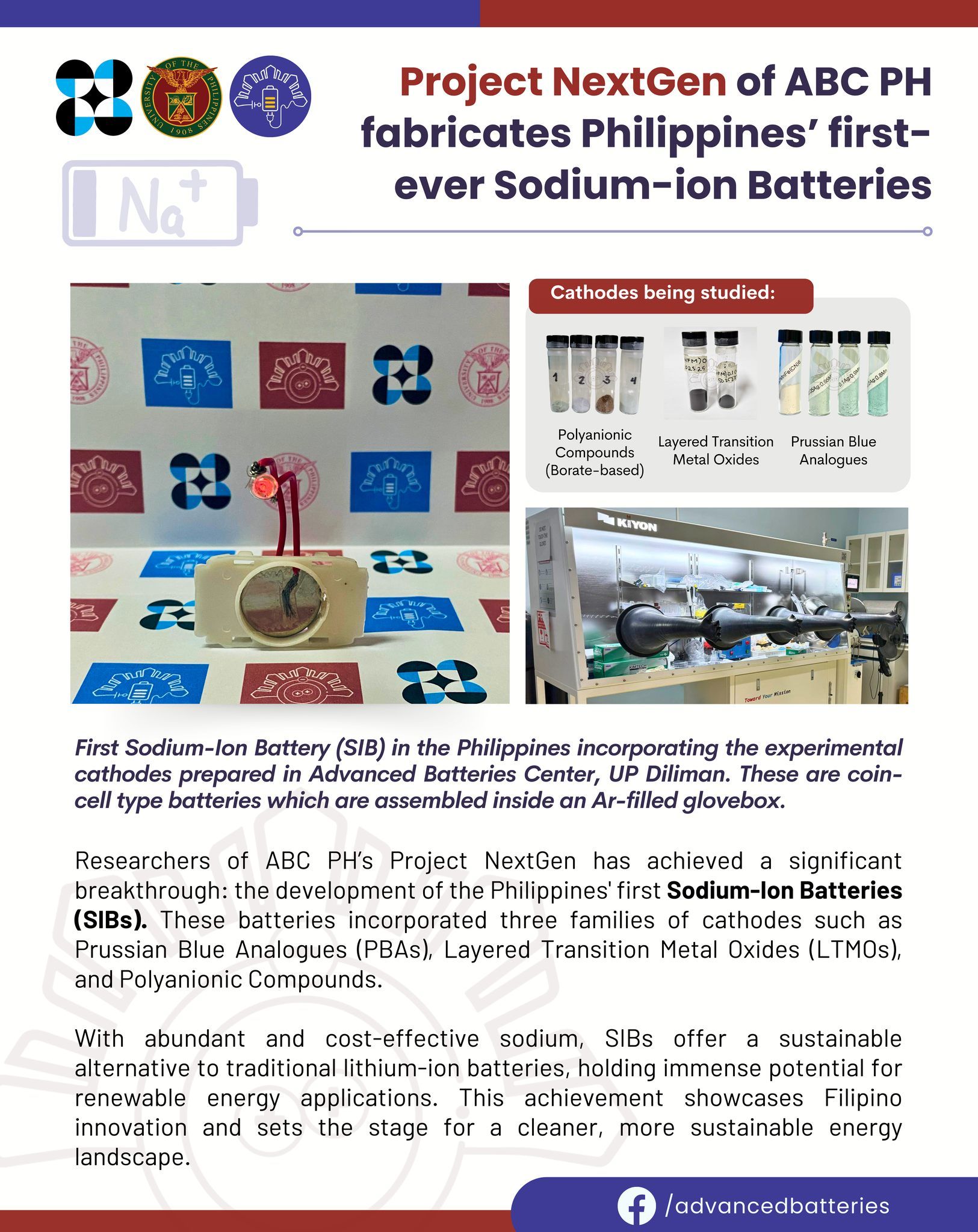
By Mecaelah Palaganas
•
20 Mar, 2024
Researchers of 𝗔𝗕𝗖 𝗣𝗛’𝘀 𝗣𝗿𝗼𝗷𝗲𝗰𝘁 𝗡𝗲𝘅𝘁𝗚𝗲𝗻 has achieved a significant breakthrough: the development of the 𝐏𝐡𝐢𝐥𝐢𝐩𝐩𝐢𝐧𝐞𝐬' 𝐟𝐢𝐫𝐬𝐭 𝐒𝐨𝐝𝐢𝐮𝐦-𝐈𝐨𝐧 𝐁𝐚𝐭𝐭𝐞𝐫𝐢𝐞𝐬 (𝐒𝐈𝐁𝐬). These batteries incorporated three families of cathodes such as 𝙋𝙧𝙪𝙨𝙨𝙞𝙖𝙣 𝘽𝙡𝙪𝙚 𝘼𝙣𝙖𝙡𝙤𝙜𝙪𝙚𝙨 (𝙋𝘽𝘼𝙨), 𝙇𝙖𝙮𝙚𝙧𝙚𝙙 𝙏𝙧𝙖𝙣𝙨𝙞𝙩𝙞𝙤𝙣 𝙈𝙚𝙩𝙖𝙡 𝙊𝙭𝙞𝙙𝙚𝙨 (𝙇𝙏𝙈𝙊𝙨), 𝙖𝙣𝙙 𝙋𝙤𝙡𝙮𝙖𝙣𝙞𝙤𝙣𝙞𝙘 𝘾𝙤𝙢𝙥𝙤𝙪𝙣𝙙𝙨. With abundant and cost-effective sodium, SIBs offer a sustainable alternative to traditional lithium-ion batteries, holding immense potential for renewable energy applications. This achievement showcases 𝗙𝗶𝗹𝗶𝗽𝗶𝗻𝗼 𝗶𝗻𝗻𝗼𝘃𝗮𝘁𝗶𝗼𝗻 and sets the stage for a cleaner, more sustainable energy landscape. --- 𝗔𝗱𝘃𝗮𝗻𝗰𝗲𝗱 𝗕𝗮𝘁𝘁𝗲𝗿𝗶𝗲𝘀 𝗖𝗲𝗻𝘁𝗲𝗿 𝗣𝗵𝗶𝗹𝗶𝗽𝗽𝗶𝗻𝗲𝘀 (𝗔𝗕𝗖 𝗣𝗛) is a collaborative R&D program between Technological Institute of the Philippines (TIP) and University of the Philippines Diliman (UPD) funded by the Department of Science and Technology (DOST) through DOST-Science for Change Program. The three projects under this program focus on innovating different battery chemistries. The 𝗡𝗲𝘅𝘁𝗚𝗲𝗻 𝗣𝗿𝗼𝗷𝗲𝗰𝘁 aims to develop advanced cathode materials for next-generation batteries. The 𝗥𝗘𝗕𝗖𝗲𝗹𝗹 𝗣𝗿𝗼𝗷𝗲𝗰𝘁 targets to renew the Edison Battery using advanced cell architecture. 𝗔𝗟𝗔𝗕-𝗘𝗨 𝗣𝗿𝗼𝗷𝗲𝗰𝘁 pursues to develop advanced lead acid batteries with embedded ultrasonics.


